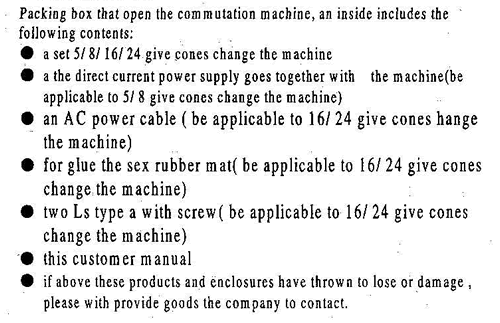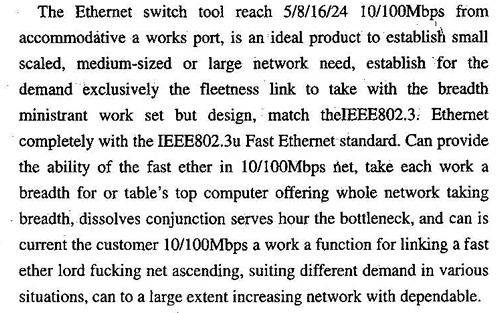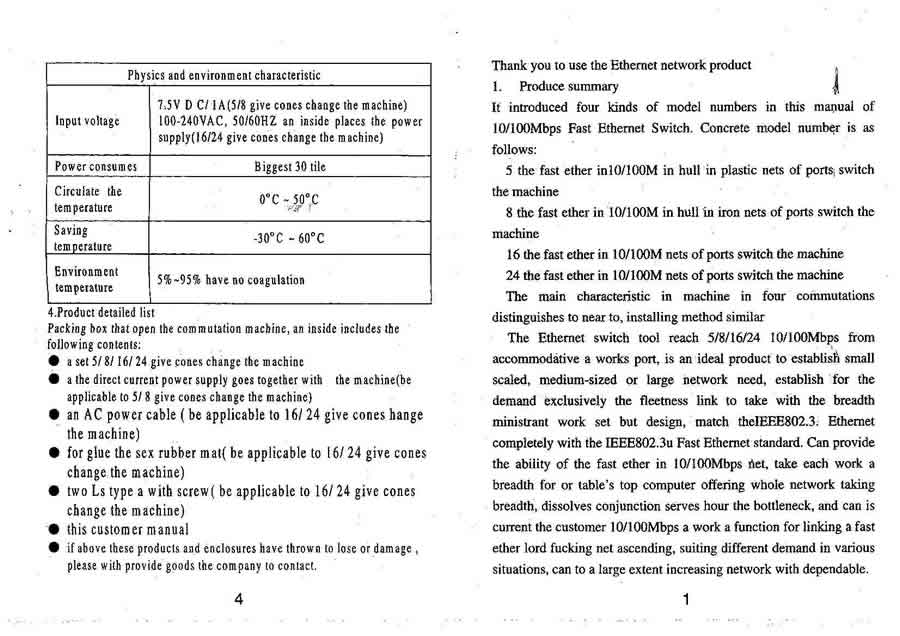August 31, 2007
For glue the sex rubber mat
Would you buy a data switch whose assembly instructions include the phrase "For glue the sex rubber mat"? If your answer is "yes", [insert joke about Senate Republicans].
The datasheet that shipped with a Cisco switch, reported by Jake Vinson at Worse Than Failure, provides yet another example of translation from the Chinese by dictionary look-up. Some of the items are terms that might be English in some alternative universe, like "commutation machine" in place of "switch". Others are amusing mistakes that we've seen before, like "sex" in place of "type", which turned "one-time-type item" (i.e. "disposable item") into "a time sex thing" on an aisle sign at the Beijing Century Mart. Here it's "for glue the sex rubber mat", which I surmise might be a rubber-type pad to be attached in one of the machine's configurations:

(What do you suppose those "cones" are? "Modules", maybe?)
This next section features another old friend, in the phrase "a fast ether lord fucking net ascending". This learned discussion by Professor Victor Mair will give you a clue about how the f-word snuck in there -- and I suspect that the evocative "fast ether lord" is just a prosaic old "fast ethernet controller":

A larger sample of the datasheet is here:

Can it really be true that this is shipped with a Cisco product? It's understandable to see this kind of thing on a label or menu in a restaurant; it's more surprising to see it in the aisles of a hypermarket; but you'd think that a big-time multinational technology company would pay a little more attention. Richard Eng needs to point his Murciélago northwards, right away!
If you happen to have a copy of the Chinese original of this data sheet (unfortunately Jake Vinson's post doesn't specify the model number), please let me know.
[Update -- a google search for "give cones change the machine" turns up a number of things, including this. But "glue the sex rubber mat" comes up empty.]
[Update #2 -- Mel Wilson has a better idea about those "give cones":
It seems as though the product is one of a family of ethernet hubs or switches, with variants having 5, 8, 16 or 24 ports; so
5/ 8/ 16/ 24 give cones change the machine
would refer to the switch with the appropriate number of ports. 'Change' might have meant something like 'version', and 'give cones' somehow comes from 'sockets' or 'ports'.
I imagine the product comes with a sheet of pre-punched adhesive rubber feet to stick on the bottom.
Yes, but only for 16/24 give cones change the machine...
Seriously, I'm sure that Mel is right -- "16/24 give cones change the machine" must mean "the 16/24-port version of the machine".
Florian Weimer adds another piece of evidence:
I think the phrase "16/24 give cones change the machine" means "16 or 24 Ethernet ports". The smaller models with just 5 or 8 ports have got external power supplies; only the larger ones need an AC power cable.
Indeed -- add the insight that "change" means "version (of)" and the found poetry becomes a sensible and prosaic observation. ]
[Update #3 -- Brent Eades tries a clever experiment:
Use Google Translate, translate 'For glue the sex rubber mat' into Chinese (Simplified.)
Take the Chinese characters returned, then translate them back into English.
We get: "For adhesion of the rubber pad"
As for "give cones change the machine", repeating the above steps gives us "To change the tube machine". This is surprising; I would have thought Cisco had discovered semiconductors by now.
Finally, "fast ether lord fucking net ascending" gives us "Fast Ethernet main net or hell". Also surprising. And worrisome.
]
[Update 1/10/2008 - Lewis Jardine writes:
I think you've misread something: DailyWTF describes it as a 'Crisco switch' - i.e. a cheap generic one (Crisco being a brand of cooking oil). The same joke as when Homer goes to buy a 'Panaphonics' TV.
Maybe so -- in any case it has always bothered me that the scans did not include any brand indication. But just for the record, Crisco was basically and originally a brand of solid vegetable shortening, a lard substitute made by hydrogenating vegetable oil.]
Posted by Mark Liberman at August 31, 2007 06:47 PM